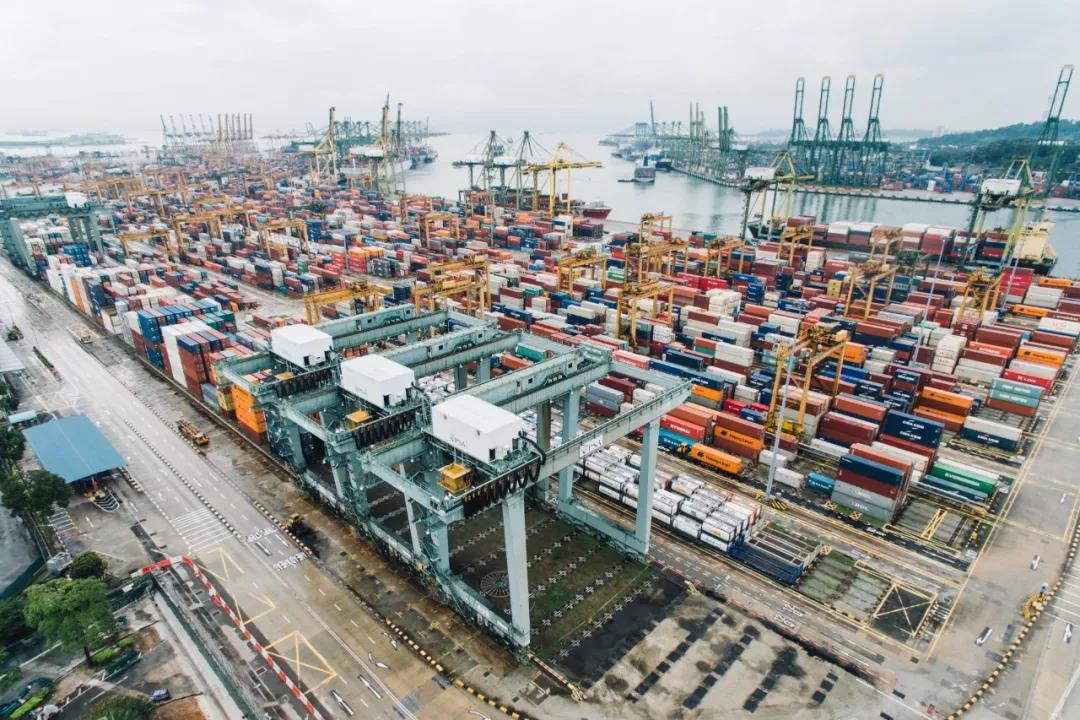The global buying and buying of the Expo, cross-border trade opportunities in the blockchain

Author: Wang Qiao
Source: Zinc Link
The Expo is the vane of cross-border trade. The blockchain is regarded as a breakthrough in core technology and is becoming an important underlying technology for China to build a global trading system.
- PricewaterhouseCoopers analyst: The traceability of the blockchain is just "illusion"
- Economic Daily: Blockchain, down-to-earth to a bright future
- Max Keiser: Bitcoin’s “self-settlement” attribute challenges the dollar
On November 5th, the second session of China Expo, which represented China's active integration into economic globalization, kicked off, and 500,000 buyers gathered in Shanghai, including over 7,000 overseas buyers. It is reported that the initial purchase volume of the first China Expo will be 57.83 billion US dollars, and this year's scale will far exceed last year.
At the Expo, ant Jinfu CEO Jing Xiandong believes that the blockchain can establish a trust system under the trend of economic digitization. This is the infrastructure of the future digital economy, which will support the high degree of synergy among the digital economy participants, thus completing the information. The leap from the Internet to the value of the Internet.
At the same time, the Industrial and Commercial Bank of China Sichuan Branch also released the country's first multimodal transport-single-system cross-border blockchain platform – "China Europe e-Single."
In addition, what opportunities can we see from it?
Today's international supply chain is becoming more and more mature, and the whole chain industry is constantly being subdivided. Various types of intermediaries serving the supply chain flow have emerged, involving a large number of participants. A refined division of labor can increase efficiency, but more links mean that transaction costs will surge.
UN/CEFACT statistics show that the average cost of international trade documents accounts for about 5-10% of the value of international trade. On average, each cargo involves 27 trade participants, 40 documents and 400 copies.
The full chain efficiency of cross-border trade needs to be improved.
The whole process is divided into three rings of purchase, transportation and payment. At present, the solutions on the market mainly focus on transportation and payment.
The decentralization and distributed storage of the blockchain can break through the entire process of cross-border trade, reduce intermediate institutions, and reduce trade costs.
Opportunity 1: Visible cross-border logistics
At the Expo, the French President Mark Long personally promoted French wines.
In fact, China is France's third-largest wine export market and the fifth largest wine consumer and wine importer in the world after the United States, France, Italy and Germany.
Cross-border transportation and traceability of wine is one of the important scenes of the blockchain.
On the one hand, the blockchain can improve the efficiency of cross-border wine logistics, and clearly record and store the transportation process in the chain, which is beneficial for logistics companies to rationally allocate, integrate resources and reduce intermediate links.
On the other hand, achieve the mosaic and transparency of cross-border logistics information. On the basis of blockchain technology, it can effectively solve the problems of asymmetry, difficult traceability and opacity of cross-border logistics information, and can fully grasp the data information and form a smooth and transparent information flow on the chain.
At present, large-scale e-commerce companies and logistics organizations at home and abroad have rushed to the beach, using blockchain technology to optimize every aspect of logistics.
In May of last year, Tmall International announced that it has successfully integrated blockchain technology into the company's cross-border logistics business.
According to Tmall, its blockchain-based system can track all relevant information about imported goods, including origin, transit by port, arrival port, customs report, inspection and third party verification.

(Image courtesy of unsplash)
Cheng Yan, head of Jingdong Logistics R&D Department, has publicly stated that the blockchain can build a traceable and identifiable system for product management from production, warehousing to distribution for the logistics industry, and is a cross-border logistics in complex international supply chains. Secure transactions in the system and effective communication provide application space.
In April this year, the Tianjin Port Blockchain Verification Pilot Project was launched. Since then, Tianjin Port has realized the deep integration of transaction, finance, logistics and supervision in blockchain technology and cross-border trade.
In August of this year, both the United States and Thailand released plans to test the use of blockchain procedures for tracking and managing shipments. Thailand plans to use IBM's blockchain-based logistics platform Tradelens to improve customs processes such as data sharing.
Patama Chantaruck, Managing Director of IBM Thailand and Vice Chairman of China-India Peninsula Expansion, said that TradeLens will provide the Thai Customs Department with an automated and non-tamperable tracking tool that will lead to safer, transparent, efficient and simple workflows. Near-real-time information sharing in a diverse ecosystem of member networks.
Chantaruck believes that as long as the container leaves the port of origin, Tradelens sends the shipping data to the customs authorities, which in turn allows the customs department to have more time to prepare for the shipment and to conduct fraud and forgery checks.
TradeLens's official website claims that its ecosystem includes more than 100 different organizations, including operators, ports, terminal operators, third-party logistics companies and freight forwarders. A map of its website shows that more than 60 ports and terminals worldwide are directly integrated with TradeLens.
Logistics information is on the chain, the entire process is visualized, easy to monitor and track.
Opportunity 2: Cross-border payment from 24 hours to 3 seconds
“Slow, expensive” is the biggest problem facing cross-border payments. For both parties to the trade, the time cost of “on the road” is too high.
The existing cross-border payment generally adopts the SWIFT network, and the payment transaction information needs to be transferred and processed between multiple banking institutions. Usually, a cross-border transaction needs at least 24 hours to complete, and the cost is high, and the average payer has to pay. The handling fee is as high as 7.68%, and users can't know the status of transaction processing and capital dynamics in real time.
The use of blockchain technology for cross-border payment and clearing settlement, without the need for intermediate institutions, can avoid the handling fees incurred in the middle of the transfer, and even the payment is not subject to time constraints, real-time arrival.

(Image courtesy of unsplash)
In June 2018, Ant Financial showed the cross-border remittance of the blockchain, and the whole process took only 3 seconds to arrive.
“In the past, it took a week or two to get money from Hong Kong to the Philippines, and the exchange rate in the middle was very high. This is very uneconomical for some Filipino maids in the service industry.” Ant blockchain Product Director Yu Peng said that the use of blockchain technology for cross-border remittances is not only fast, but also clearly tracks the flow of funds. This is a very good application scenario for blockchain technology.
Traditional banks have also begun to test the water.
Bank of China integrates the internal application system with the blockchain platform, and quickly completes the trusted sharing of payment transaction information between the participants on the platform. The settlement of the customer account can be completed within a few seconds. Users can query the transaction processing status in real time and track the fund dynamics in real time. At the same time, banks can sell accounts in real time, get account position information in real time, and improve liquidity management efficiency.
In September last year, the Bank of China completed the US dollar international remittance between customers in Hebei Xiong'an and Seoul, South Korea through a blockchain cross-border payment system.
In March of this year, the foreign exchange bureau piloted 14 banks in 7 provinces and cities including Beijing, using blockchain technology to build a cross-border financial blockchain service platform, and establishing end-to-end trusted information exchange and effective verification and banking between banks and enterprises. Inter-industry trade financing information real-time interaction two mechanisms to create a credit eco-environment in the cross-border financial sector and enhance the bank's risk control capabilities.
According to the CCTV2 financial channel news, as of the end of October this year, the cross-border financial blockchain service platform accumulated 6370 accounts receivable financing, the loan amount was equivalent to 6.77 billion US dollars, and the service enterprises totaled 1262, of which the middle community enterprises accounted for about 70%. %.
Payment time is shortened, capital turnover is more efficient, and key challenges in cross-border trade are solvable.
Opportunity 3: File winding, fast clearance
Customs is the core department of import and export trade. Customs clearance, review and customs clearance often take a long time.
The World Bank's statistics also show that in the more than 100 countries surveyed, the customs clearance time for customs in 2017 was an average of 7.53 days.
It is imperative to increase the speed of customs clearance, and the digitization of customs documents is a prerequisite for improving efficiency.
The EU is studying the use of blockchain technology to digitize ATA Carnet (an international customs document used by 87 countries to declare duty-free imports).
Although traditional electronic data interchange systems have played a pivotal role in this process, they still face the problem of authenticity and the inability to update real-time data. Introduce blockchain technology to provide secure shipping data and documents in real time.
However, to make paperless paper, only blockchain technology is not enough.
The World Economic Forum has published a white paper entitled “Paperless Trade: How It Will Affect the Trading System”, which states that there is concern about the authenticity of electronic documents, which requires an electronic signature system and an acknowledgement. A new legal framework for electronic signatures.
In addition, the blockchain can also solve the problems of traceability of import and export commodities.
China is actively integrating into the global economy. It must not only “sell” but also “buy in”, which will form a global value chain and supply chain. The blockchain will become an important underlying technology in the global trading system .
We will continue to update Blocking; if you have any questions or suggestions, please contact us!
Was this article helpful?
93 out of 132 found this helpful
Related articles
- Dragon White: Is it difficult to get out of it? Global Stabilization Currency Risks and Challenges
- Tether's latest response "Single Whales Drive 2017 BTC Rise": Defective, nonsense, insult to the community
- Logistics + blockchain: improving ecosystems and giving new opportunities to the transportation industry
- Interpretation of the new SFC regulation: How to operate a licensed virtual asset exchange in Hong Kong?
- Interpretation: The road to energy saving and emission reduction, from PoW to PoC
- Counting the liquidity of the Big Three, the final end of Bitcoin is digital government bonds?
- Jianan Zhizhi's total revenue in the third quarter was 670 million yuan, and mining machine revenue accounted for 98.3%.





